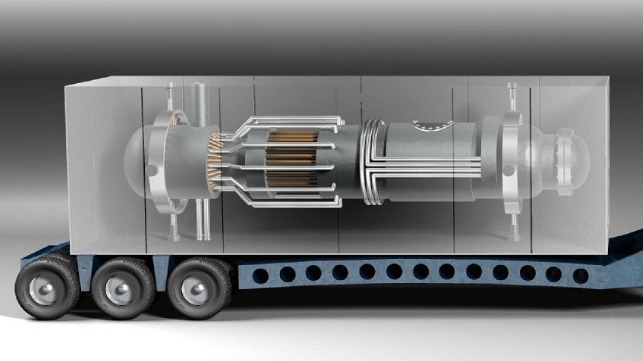ABS: Nuclear Propulsion Could Be "Transformative" for U.S. Shipping

The U.S. Department of Energy is investing $8.5 million in research on small, modular nuclear reactors - including reactor technology for marine propulsion.
DOE has awarded ABS nearly $800,000 to address challenges to the adoption of new reactor technology in commercial maritime applications. Conventional pressurized-water reactors have been in use in military propulsion for decades, and they are in civilian government use in Russia, but they have had few commercial applications in the maritime industry.
As the sector looks for new zero-carbon alternatives to traditional bunker fuel, nuclear power has re-emerged as a possible solution. It has very high power density, long range and an achievable cost structure. In addition, new "nuclear battery" microreactor designs promise simpler operation and higher inherent safety compared to the legacy pressurized-water reactors of yesteryear.
"Advanced nuclear technology is positioned to be one of the strongest tools available to the industry for achieving the aggressive decarbonization goals that are fundamentally changing the shipping and offshore industry’s assets and infrastructure," ABS wrote in its prospectus. "This project will improve drastically the timeline for advanced reactor technology deployment for commercial maritime applications."
The objectives include laying out business cases and demonstration project pathways, from initial on-site demonstrations at DOE facilities up to full-scale testing in a maritime environment. ABS will also develop models of different advanced reactor technologies for maritime applications, and it will write an industry advisory on the commercial use of modern nuclear power.
"The variety of emerging small modular reactor and micro-reactor technologies offer drastically different value propositions and operating envelopes compared to legacy technology," ABS wrote. "The concept of interchangeable 'nuclear batteries' for powering ships and barges and/or industrial processes on offshore assets is a game changer for the industry."
Even better, ABS suggests that building a U.S.-based nuclear propulsion industry could revitalize U.S. shipping companies and shipyards, which "have suffered without a competitive differentiator from foreign competitors." It could mean a potential market for hundreds of vessels, supporting American engineers, shipbuilders, mariners, and the U.S. nuclear supply chain. "This technology would be transformative for the U.S. economy and clean-energy job growth, while also supporting the clean power and decarbonization initiatives of the government," ABS predicted.
The class society acknowledged that uptake of nuclear propulsion has historically been limited not just by technical hurdles, but by negative perceptions of legacy nuclear power technology. After shoreside incidents like the pressurized-water reactor meltdowns at Three Mile Island, Chernobyl and Fukushima, "nuclear" has unfavorable associations for some members of the public.

that matters most
Get the latest maritime news delivered to your inbox daily.
For nuclear vessel operators, this perception issue can translate into port access challenges. The most prominent example is in New Zealand, which has a long-standing ban on all nuclear activity, including any nuclear vessels in its ports and territorial seas.
Perceptions can also create port of refuge challenges for nuclear vessels, even for ordinary breakdowns. In 2020, the Russian nuclear-powered cargo ship Sevmorput suffered a reported propeller failure off West Africa during a resupply voyage to Antarctica. Operator Rosatom wanted to bring her into Angolan waters for repairs, but this was not permitted by the local government. The main access challenge was that Sevmorput is "a ship with a nuclear power plant, which requires 'complex coordination with the authorities of the country,'" the agency told Kommersant. Without access to a sheltered harbor for dive repairs, the ship had to cancel her voyage and sail back to St. Petersburg at reduced speed.
